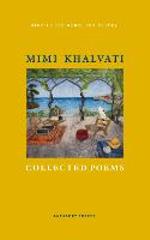Mimi Khalvati, one of our best-loved poets, was born in Tehran, Iran, and sent away to boarding school on the Isle of Wight at the age of six, only returning to her family in Iran when she was seventeen. The loss of her native country, culture and mother tongue formed the bedrock of her adoptive love of the English language and its lyric tradition. ‘But,’ she says, ‘whether drawing on my few memories of Iran, my long years in London and travelling in the Mediterranean, or on that central void always facing me, I have celebrated the richness of a life that can be lived without a clear sense of heritage, family history or personal biography.’ That wealth is reflected in the wide variety of style, tone and architecture in her Carcanet poetry collections over thirty-three years – free and metrical verse, ranging from short, fixed forms to extended lyrical sequences, from ghazals to the heroic corona or book-length series of sonnets. ‘I hope’, she writes, ‘the poems speak especially to those who have made their homes wherever the tide has brought them, sometimes in language itself, and to those who have no story but place their trust in the flux and flow, the vision of the lyric moment.’

Collected poems
ISBN: 9781800173330
Format: Paperback
Publisher: Carcanet Press
Origin: GB
Release Date: November, 2024


